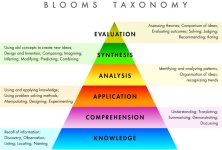jct, please don't get discouraged by members who don't agree with your way of wanting to learn. What they don't understand is how learning truly works. I have an education degree (teaching music), but the fundamentals of learning are the same.
By dialing in the settings to use to replicate a scene, it is the most basic of learning which is
rote. Think of a child learning his/her ABC's. They can sing the letters to a melody, but they really don't understand what the letters are. They can neither write the letters nor can they read them. You won't learn a whole lot this way yet down the road you will gain the understanding as to why those settings work. Learning involves climbing the ladder of knowledge, and Bloom's Taxonomy is an example of learning (image comes from
Bloom’s Taxonomy: Encouraging Higher Cognitive Thinking in Primary School Classrooms | Successful Teaching)

Learning by rote falls into the Knowledge category of Bloom's Taxonomy so it shouldn't be knocked.

Here are the basics of photography:
Aperture: The aperture is the f-stop number such as f/2.8, f/4, f/5.6 and can go really high such as f/32. The aperture will control the depth of field. If you want a shallow depth of field, you will want a lower number (lower as in f/2.8 or f/4). If you want more sharpness throughout the image, you will want a higher aperture such as f/11 or f/16.
Shutter Speed: The shutter speed is the length of time it takes to record the image such as 1/250" (the " denotes seconds), 1/16", 1 second, etc. If you want to intentionally show some blur, you will want to use a slower shutter speed. If you want to make sure you achieve sharp focus, any possibility of motion must be frozen using a faster shutter speed.
ISO: The ISO dictates the amount of noise and measures the amount of light hitting the sensor. It also can act as a way to balance the aperture and shutter speed--by raising the ISO, you are able to use a faster shutter speed and/or a smaller aperture.
Take a look at this article which explains it further:
Learning about Exposure - The Exposure Triangle - Digital Photography School


